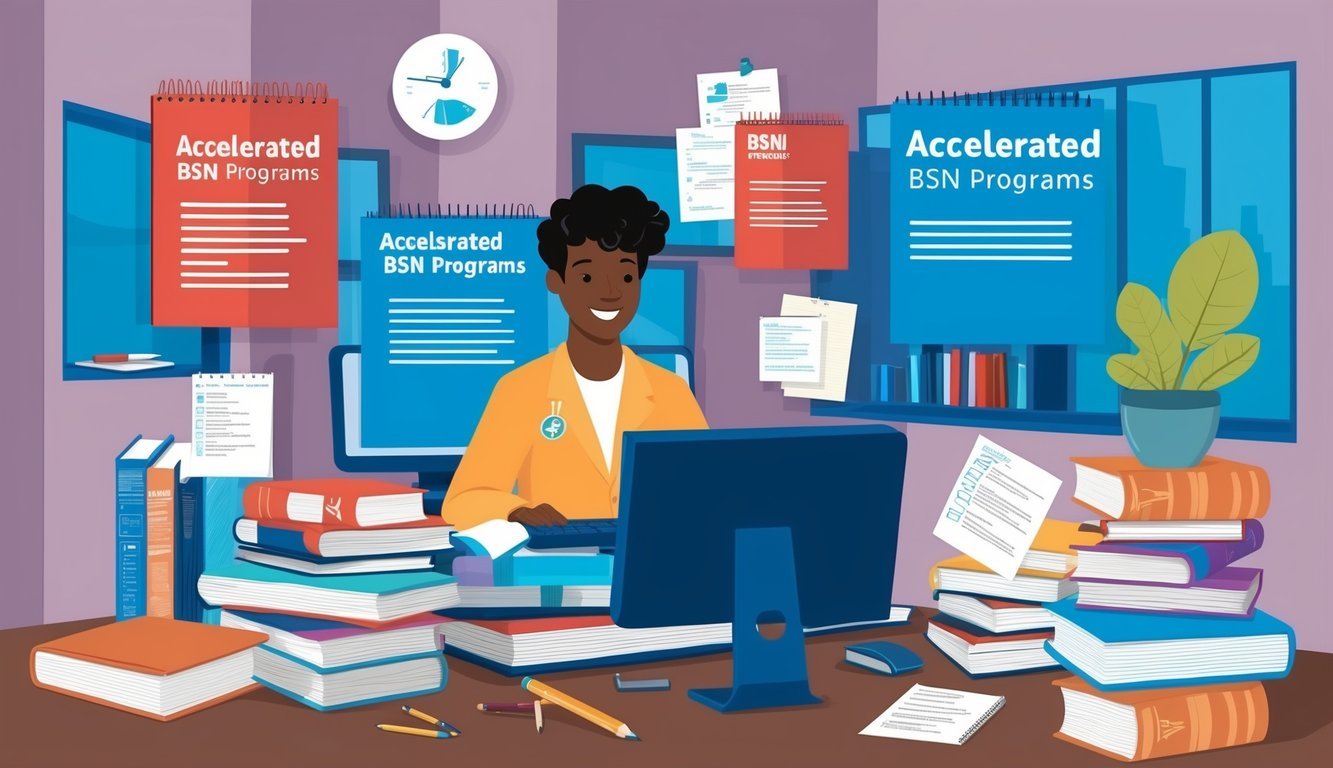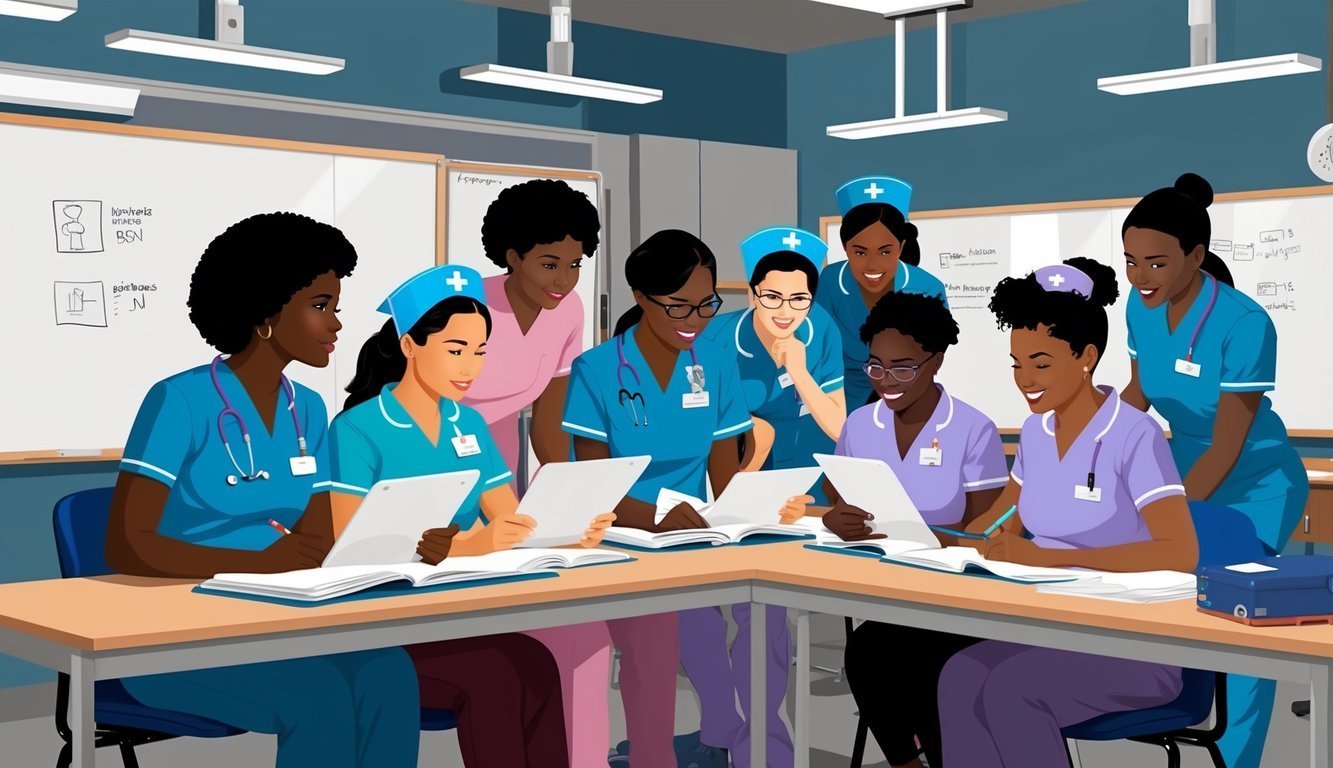If you’re considering a career in nursing and already hold a bachelor’s degree in another field, you might find an accelerated Bachelor of Science in Nursing (ABSN) program to be the perfect solution.
These programs allow you to earn your BSN in a shorter time frame, typically ranging from 12 to 18 months.
This fast-track approach enables you to transition into the nursing profession efficiently while obtaining the necessary skills and knowledge.
Accelerated BSN programs are specifically designed for individuals who wish to switch careers and need a comprehensive yet expedited education.
Many universities offer options that include both online courses and hands-on clinical experiences, ensuring you receive a well-rounded education.
For a detailed comparison of ABSN programs, you can explore the top choices in the country, highlighting factors like cost and acceptance rates.
Taking the leap into nursing can be daunting, but with the right information and support, you can make a successful transition.
If you want to learn more about specific programs and how to apply, check out resources like Nurse.org which can guide you through the steps.
Understanding Accelerated BSN Programs
Accelerated BSN programs are designed for individuals seeking a nursing career at a quicker pace.
These programs enable you to earn a Bachelor of Science in Nursing (BSN) in a shorter time frame, often ranging from 11 to 18 months.
Overview of Accelerated BSN
Accelerated Bachelor of Science in Nursing (ABSN) programs are ideal for those who already hold a bachelor’s degree in a non-nursing field.
They focus on fast-track nursing education, combining rigorous coursework with clinical practice.
Courses cover essential nursing topics such as:
- Anatomy and Physiology
- Nursing Fundamentals
- Pharmacology
- Community Health Nursing
Real-world clinical experience is a critical component, allowing you to apply skills in healthcare settings.
Upon completion, graduates typically achieve high NCLEX pass rates, enhancing job prospects.
Comparing BSN Degree Pathways
When considering nursing education, it’s essential to compare different BSN pathways.
The traditional BSN program usually takes four years, whereas accelerated programs drastically reduce this time frame.
| Pathway | Duration | Prerequisites |
|---|---|---|
| Traditional BSN | 4 years | High school diploma + prerequisites |
| Accelerated BSN | 11–18 months | Bachelor’s degree in a non-nursing field |
Accelerated nursing programs are intensive and require a significant commitment.
This makes them suitable for individuals ready for a fast-paced educational environment.
Whether you choose a traditional BSN or an accelerated route, understanding each pathway helps you select the best option for your career goals.
For more information on accelerated BSN programs, you can explore this comprehensive guide.
Curriculum and Clinical Experience
The curriculum for an accelerated BSN program combines fundamental nursing principles with extensive clinical experience.
This integration fosters a well-rounded education, ensuring you are prepared for real-world patient care scenarios upon graduation.
Nursing Coursework Highlights
In your accelerated BSN program, you will encounter rigorous nursing coursework that emphasizes both theoretical knowledge and practical skills.
Key subjects typically include:
- Pathophysiology: Understanding disease processes.
- Pharmacology: Learning about medications and their effects.
- Health Assessment: Developing skills for comprehensive patient evaluations.
- Nursing Leadership: Gaining insights into effective healthcare management.
Courses are designed to enhance critical thinking and evidence-based practice.
Engaging in discussions, group projects, and case studies builds teamwork skills essential for nursing practice.
You will also have access to resources that guide your learning, such as online platforms and consultation with faculty.
Clinical Rotations and Simulations
Clinical rotations play a crucial role in your education, allowing you to apply theoretical knowledge to real-life scenarios.
These rotations occur in various healthcare settings, including hospitals, outpatient clinics, and long-term care facilities.
During clinical training, you will:
- Participate in diverse patient care experiences.
- Work under the supervision of licensed nurses.
- Gain competency in performing clinical procedures.
Simulation labs provide a safe environment for practicing skills before working with actual patients.
Here, you may engage in scenarios that mimic real clinical situations, improving your decision-making and technical abilities.
This hands-on training is vital for building confidence in your nursing practice.
Integration of Online and Hands-On Learning
Most accelerated BSN programs effectively integrate online coursework with hands-on clinical training.
This hybrid approach allows for flexibility in your schedule while ensuring comprehensive learning.
Courses delivered online enable you to study at your pace, covering foundational nursing concepts.
In contrast, your hands-on clinical training reinforces this knowledge by applying it in practical settings.
You will engage in:
- Interactive modules and discussion boards.
- Assessments that test your understanding of nursing principles.
- Real-time feedback during clinical simulations and rotations.
This blend enhances your ability to adapt to various learning styles, preparing you for the demands of the nursing profession and improving your patient care skills.
Admission Requirements and Program Details
When considering an Accelerated Bachelor of Science in Nursing (ABSN) program, it’s essential to understand the prerequisites, the program’s intensity and duration, and the associated costs.
This section will guide you through these critical aspects.
Prerequisites for Entry
To gain admission into an ABSN program, you typically need a bachelor’s degree in a non-nursing field.
Most programs require a minimum cumulative GPA of 2.75.
Additionally, specific prerequisite courses must be completed with a grade of C or higher, which usually includes subjects like:
- Anatomy and Physiology
- Microbiology
- Statistics
- Psychology
Some programs may also require volunteer or clinical experience in healthcare settings.
Before applying, verify the specific requirements for the school you are interested in, such as those at Baylor University’s ABSN program.
Program Length and Intensity
The ABSN programs are designed to be intensive and typically last between 11 to 18 months.
You can expect a full-time commitment, with coursework delivered through a mix of online classes and in-person clinical experiences.
Here’s a breakdown of the structure:
| Component | Duration |
|---|---|
| Online Coursework | Varies (15 weeks) |
| Clinical Practicum | 720 hours total |
| On-Campus Intensive | 2 weeks |
The rigorous nature of the program demands effective time management and dedication.
Many students choose to balance stipends with their studies, leveraging available financial aid options to help ease the financial burdens.
Understanding the Cost of Education
Tuition costs for ABSN programs generally range from $30,000 to $50,000, depending on the institution.
It is critical to account for additional fees such as textbooks, uniforms, and clinical supplies.
You may also explore financial aid options:
- Federal Student Aid
- Private Scholarships
- Payment Plans
Many schools offer support to assist in navigating funding options.
Consider reaching out directly to your prospective institution to discuss tailored financial assistance plans, ensuring you have a clear understanding of the total investment required for your degree.
Accreditation and Educational Standards
Accreditation is a critical component of nursing education, particularly for Accelerated Bachelor of Science in Nursing (ABSN) programs.
It ensures that programs meet specific educational standards and prepares you for a successful career in nursing.
Understanding the role of accrediting bodies and the significance of accreditation can greatly impact your educational choices.
National and Regional Accrediting Bodies
Two primary accrediting bodies oversee nursing programs in the United States.
The Commission on Collegiate Nursing Education (CCNE) accredits baccalaureate and graduate nursing programs.
The CCNE focuses on program quality and outcome measures.
Another important entity is the Accreditation Commission for Education in Nursing (ACEN).
ACEN accredits all types of nursing education programs, including practical, associate, and bachelor’s degrees.
Here is a brief overview of both organizations:
| Accrediting Body | Type of Programs | Focus |
|---|---|---|
| CCNE | Baccalaureate, Graduate | Quality and outcomes |
| ACEN | All program levels | Program integrity |
Importance of Accreditation
Accreditation signifies that a nursing program meets high standards of quality and integrity.
This is crucial for you as it impacts your educational experience and future employability.
Programs that are CCNE accredited or accredited by ACEN have undergone rigorous evaluations.
Attending an accredited nursing program provides several benefits, including eligibility for federal financial aid and meeting prerequisites for licensure examinations.
Employers often prefer graduates from accredited programs, which enhances your career prospects.
By choosing an accredited Accelerated BSN program, you can ensure that your education meets the demands of the healthcare industry.
Career Outlook for Accelerated BSN Graduates

The career outlook for graduates of Accelerated Bachelor of Science in Nursing (ABSN) programs is strong, driven by a growing demand for registered nurses (RNs) across various healthcare settings.
This section explores the roles you can pursue, the impact of current nursing shortages, and options for furthering your education.
Roles and Specialties in the Nursing Field
As an ABSN graduate, you will be equipped for numerous roles within the nursing profession.
Some common positions include:
- Registered Nurse (RN): Provide direct patient care, administer medications, and manage patient records.
- Clinical Nurse Specialist: Focus on improving patient outcomes in specialized areas like cardiology or oncology.
- Nurse Practitioner (NP): Offer advanced care, including diagnosis and treatment of health conditions.
You can also explore specialties such as pediatrics, geriatrics, and emergency nursing, each presenting unique challenges and rewards.
The versatility of nursing roles allows you to align your career with personal interests and strengths.
The Impact of Nursing Shortages
The nursing profession currently faces a significant shortage, with estimates indicating a need for over 194,500 new RN positions annually, encompassing both new and replacement jobs.
This shortage is prevalent across healthcare settings, including hospitals, clinics, and long-term care facilities.
Factors contributing to this deficit include:
- Aging population requiring more healthcare services
- Increased focus on preventive care and chronic disease management
- High turnover rates among nursing staff
With this increasing demand, your prospects for stable employment and competitive salaries will be enhanced significantly, making it an opportune time to enter the field.
Continuing Education and Advanced Degrees
Furthering your education can open additional doors in your nursing career.
Many RNs choose to pursue graduate-level coursework, leading to roles such as:
- Advanced Practice Registered Nurse (APRN): Includes Nurse Practitioners, Clinical Nurse Leaders, and Nurse Midwives.
- Nurse Educator: Teaching future generations of nurses in academic settings.
Programs such as a Master of Science in Nursing (MSN) or Doctor of Nursing Practice (DNP) are options often pursued by ABSN graduates.
These advanced degrees prepare you for leadership roles, policy-making, and specializations within nursing care, enhancing both career opportunities and earning potential.
Selecting the Right Program

Choosing the right accelerated BSN program is a critical step in your nursing career.
You must consider factors such as program reputation, curriculum, and support services to make an informed decision.
Distinguished Programs and Universities
Several universities have established themselves as leaders in accelerated BSN education.
| University | Key Features |
|---|---|
| Duke University | Known for high NCLEX pass rates and strong faculty support. |
| Villanova University | Offers one of the fastest and most affordable programs. |
| Northeastern University | Includes unique co-op experiences in healthcare settings. |
| Loyola University Chicago | Emphasizes hands-on clinical practices and community service. |
| George Washington University | Focuses on urban health challenges and policy education. |
| University of Washington | Provides a program that adapts to the needs of diverse populations. |
| Clemson University | Has a strong emphasis on research and evidence-based practice. |
| Metropolitan State University of Denver | Offers flexible scheduling options for working professionals. |
| University of Kentucky | Provides a comprehensive curriculum with top-notch clinical placements. |
| NYU Rory Meyers College of Nursing | Known for its rigorous academic standards and global health focus. |
| University of Texas Health Science Center | Has strong ties to prominent healthcare facilities. |
You can evaluate these programs based on their unique offerings to help align your academic goals with the right institution.

